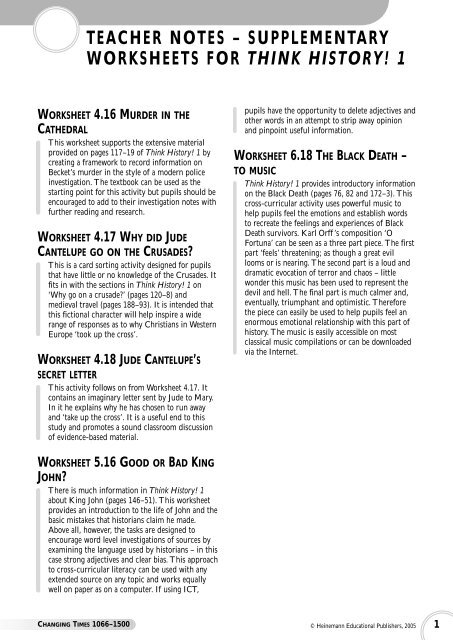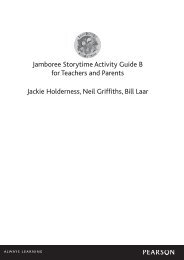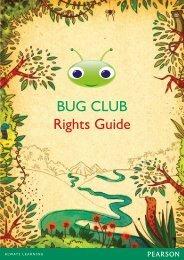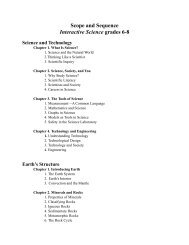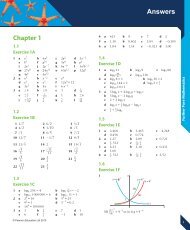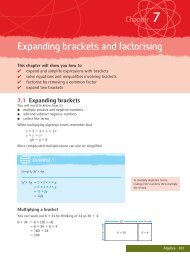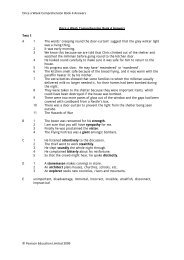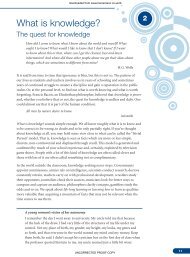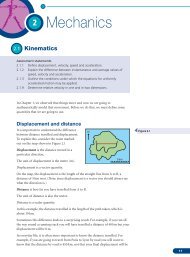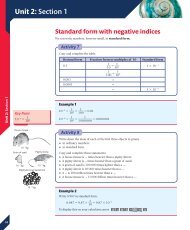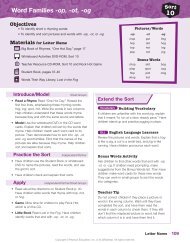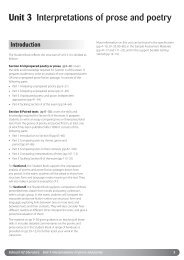Think History! Free worksheets (Jan 06) - Pearson Schools
Think History! Free worksheets (Jan 06) - Pearson Schools
Think History! Free worksheets (Jan 06) - Pearson Schools
You also want an ePaper? Increase the reach of your titles
YUMPU automatically turns print PDFs into web optimized ePapers that Google loves.
TEACHER NOTES – SUPPLEMENTARYWORKSHEETS FOR THINK HISTORY! 1WORKSHEET 4.16 MURDER IN THECATHEDRALThis worksheet supports the extensive materialprovided on pages 117–19 of <strong>Think</strong> <strong>History</strong>! 1 bycreating a framework to record information onBecket’s murder in the style of a modern policeinvestigation. The textbook can be used as thestarting point for this activity but pupils should beencouraged to add to their investigation notes withfurther reading and research.WORKSHEET 4.17 WHY DID JUDECANTELUPE GO ON THE CRUSADES?This is a card sorting activity designed for pupilsthat have little or no knowledge of the Crusades. Itfits in with the sections in <strong>Think</strong> <strong>History</strong>! 1 on‘Why go on a crusade?’ (pages 120–8) andmedieval travel (pages 188–93). It is intended thatthis fictional character will help inspire a widerange of responses as to why Christians in WesternEurope ‘took up the cross’.WORKSHEET 4.18 JUDE CANTELUPE’SSECRET LETTERThis activity follows on from Worksheet 4.17. Itcontains an imaginary letter sent by Jude to Mary.In it he explains why he has chosen to run awayand ‘take up the cross’. It is a useful end to thisstudy and promotes a sound classroom discussionof evidence-based material.pupils have the opportunity to delete adjectives andother words in an attempt to strip away opinionand pinpoint useful information.WORKSHEET 6.18 THE BLACK DEATH –TO MUSIC<strong>Think</strong> <strong>History</strong>! 1 provides introductory informationon the Black Death (pages 76, 82 and 172–3). Thiscross-curricular activity uses powerful music tohelp pupils feel the emotions and establish wordsto recreate the feelings and experiences of BlackDeath survivors. Karl Orff ’s composition ‘OFortuna’ can be seen as a three part piece. The firstpart ‘feels’ threatening; as though a great evillooms or is nearing. The second part is a loud anddramatic evocation of terror and chaos – littlewonder this music has been used to represent thedevil and hell. The final part is much calmer and,eventually, triumphant and optimistic. Thereforethe piece can easily be used to help pupils feel anenormous emotional relationship with this part ofhistory. The music is easily accessible on mostclassical music compilations or can be downloadedvia the Internet.WORKSHEET 5.16 GOOD OR BAD KINGJOHN?There is much information in <strong>Think</strong> <strong>History</strong>! 1about King John (pages 146–51). This worksheetprovides an introduction to the life of John and thebasic mistakes that historians claim he made.Above all, however, the tasks are designed toencourage word level investigations of sources byexamining the language used by historians – in thiscase strong adjectives and clear bias. This approachto cross-curricular literacy can be used with anyextended source on any topic and works equallywell on paper as on a computer. If using ICT,CHANGING TIMES 1<strong>06</strong>6–1500© Heinemann Educational Publishers, 20051
CHAPTER4WORKSHEET 4.16MURDER IN THE CATHEDRAL!You have been assigned to investigate the bloody death of Thomas Becket,Archbishop of Canterbury. Using the information on pages 117–19, andany other information you can track down, complete the investigator’sreport below.Name of detective (student):Date of inquiry:Type of crime:Victim(s):Location:Date and time of Crime:Cause of death:Witness statement(s):Prime suspect:Reasons for suspicion:Conclusions:Who did it?Motive(s):Suggested punishment:2 © Heinemann Educational Publishers, 2005CHANGING TIMES 1<strong>06</strong>6–1500
CHAPTER4WORKSHEET 4.17WHY DID JUDE OF CANTELUPE‘TAKE UP THE CROSS’ IN 1095?This is a card sorting exercise based on the 11th Century Crusades.• Sort the cards into several piles. Work out your own categories.• Start to suggest reasons as to why Jude ‘took up the cross’.• You will get to read his secret letter in a future lesson.Jude’s mother suggested that he couldjoin the priesthood or become an abbotin Shrewsbury.Jude was secretly courting the daughterof a wealthy knight, her name is Mary.Nobody knew – nobody could know!Two years ago Jude stole two silvercoins from the church collection box.He used one to buy a necklace forMary. The parish priest was very angryand told the congregation that God wasfurious and would punish the thief. Judewas too scared and ashamed to go toconfession or own up.Jude enjoyed helping the servants insome of their chores – especially theblacksmith, the gamekeeper and thebutcher.‘The Holy Land is a rich and fertileplace, much more so than the lands ofwestern Europe. I would not besurprised if many amongst you stayedthere after the crusade and prosperedwith your family.’Part of sermon preached byMartin of Paris, a monkJude missed his grandfather, who diedtwo winters ago. His grandfather likedto tell stories of far away places,magical beasts and terrifyingadventures. Above all, Jude loved thestories of Arthur and the search for theHoly Grail.Two nights before Jude ran away, awandering merchant was found at thebottom of a well – dead.Jude’s father was not a wealthy lord.Compared to others, his father’s manorwas quite small and he had lots ofdebts.CHANGING TIMES 1<strong>06</strong>6–1500© Heinemann Educational Publishers, 20053
CHAPTER4WORKSHEET 4.17WHY DID JUDE OF CANTELUPE‘TAKE UP THE CROSS’ IN 1095? (continued)‘The Turks have overrun your brothers onthe eastern shores. They are capturingand slaughtering them and destroyingtheir churches. When they are capturedthe Turks cut open their stomachs andpull out their guts and organs.’Part of a speech made by Pope Urban‘Jerusalem is at the centre of the world.But now it is controlled by enemies whomake slaves of its inhabitants and do notbelieve in God.’Part of a speech made by Pope UrbanJude’s full name was Jude Samuel ofCantelupe. He was fourteen years old(in 1095) and the second son of LordArthur of Aston Cantelupe. LordArthur’s manor was in western England,not far from the bloody border withWales.‘Forests, mountains, wild weather andstrange languages would be enough tostop me ‘taking up the Cross’. Theremust be hundreds of bandits and otherdangers along the way.’Part of a comment made by Jude’sbrother to his fatherJude’s elder brother was called William.His was well respected and admired forhis height, strength, sword skills,handsome looks and intelligence.‘All men who volunteer to fight and die,whether in battle or on their journey, willbe forgiven of any sins they havecommitted and any sins they might infuture commit. They are guaranteed aplace in heaven.’Part of a speech made by Pope Urban‘O mighty soldier, you now have acause for which to fight withoutendangering your soul. Or if you are abusinessman, you should know thatthere are vast profits to be made fromtrading with this land. All thoseamongst you that take up the cross,whether to fight, for business or forGod, you will be forgiven of all sins.’From a letter written by St Bernardof Clairvaux‘Personally I’d never dream of going tothe Holy Land. You have to cross watersso large you can’t even see land whenyou are on them. Also you have to gothrough big cities like Paris, Rome,Constantinople or even Cairo to getthere.’A comment Jude overheard inchurch one morningFact: when a lord died, his sons usuallyshared the manor amongst themselves.However, this had happened too manytimes in the Cantelupe family and themanor was too small to be divided anyfurther.4 © Heinemann Educational Publishers, 2005CHANGING TIMES 1<strong>06</strong>6–1500
CHAPTER4WORKSHEET 4.18THE SECRET LETTER OFJUDE CANTELUPE24th June 1095Dearest, dearest MaryIt is with great sorrow that I must tell you that tomorrow I shall run away and takeup the cross. Using my hidden silver coin I shall buy my own horse and ride to Ludlow.There, Simon of Shrewsbury will meet and bless those of us who want to follow PopeUrban’s call to the Holy Land.I will be gone for many days, months and years. Before I see you next I shall haveseen, heard and felt things that it would take a million years to experience if Istayed here and lived out an ordinary life. My love for you is so strong that I feel youalone deserve to know why I shall depart tonight.Just over two years ago I overheard my parents discussing marriage. My fathervisited your father to talk about your dowry! But I soon learned that they meant myolder brother, William, was to marry you. In desperation I had to try and prove mylove for you and make sure you kept your heart for me and me alone.Remember that necklace I bought you? Well I bought that with one of two silver coinsthat I stole from the collection box at church! I saw that old thief, Harry Laggins,drop them in the box and I thought God wouldn’t want money from the likes of him!So I picked them out and ran as fast as I could into the woods. It was there that Idecided to buy you a necklace next time I went to market with father.I regretted it from the minute I stopped running, but I couldn’t go back – could I? Iknew I should have gone to confessions and told Father John – but he would havemade me tell my parents. I couldn’t face my mother’s shame or my father’s belt. Iburied the other coin and swore to put it to good use one day – that day has come.Every day since then my heart has grown heavier. I know that we will never betogether. When my father dies everything will go to William. Your father is hardlygoing to let you marry a penniless thief – especially when he has a taller, richer andmore handsome brother.Last Thursday I heard that sermon by Father Jerome, who came all the way up fromPevensey. He told us how those barbarians have stolen the Holy Land and are busilydestroying Christ’s own lands. I thought nothing more until I overheard two fellowsfrom the village say the journey to the Holy Land would be full of dangers andadventures. I never could turn down an adventure. Then this morning, at Mass,Father Jerome said that Pope Urban has promised to cleanse the soul of anyone, likeme, who takes up the cross.So, Mary, I am already well on the way to Ludlow. If you have any feelings for me youwill pretend you know nothing of my disappearance. By the time they get to Ludlowand find out what I have chosen to do, I will on a ship and away.And, Mary, wait for me. I will be back before my eighteenth birthday. When I returneverything will be different, I will be different, but you will be the same.Jude Samuel CantelupeCHANGING TIMES 1<strong>06</strong>6–1500© Heinemann Educational Publishers, 20055
CHAPTER4WORKSHEET 4.18THE SECRET LETTER OFJUDE CANTELUPE (continued)Carefully read the imaginary letter above. It is written as if from Jude toMary shortly before he left. After you have read it, complete the questionsbelow.1 Establish all the reasons Jude gave for his departure. Present your reasonsas a list or a spider diagram.2 Now colour code these reasons.• Underline financial reasons in red.• Underline religious reasons in blue.• Underline emotional reasons in green.You might find that you are able to underline some reasons with morethan one colour.3 Now circle Jude’s primary motive for running away. That means youshould identify the most important reason why he left.4 Compare Jude’s explanation to the judgement you made using the sortingcards. Summarise how your ideas in the sorting exercise compare orcontrast with Jude’s reasons.5 Do you think this ‘secret’ letter from Jude is a reliable source to discoverwhy Jude left? (Clue: are there things Jude would not admit to himself orMary?)6 © Heinemann Educational Publishers, 2005CHANGING TIMES 1<strong>06</strong>6–1500
CHAPTER5WORKSHEET 5.16GOOD KING JOHN ORBAD KING JOHN?Below you will find a description of King John of England from a children’shistory book. Read it very carefully.John was probably one of the worst kings ever to have ruled England. He became king in1199 and reigned until 1216. In that time he made many mistakes and upset the Englishpeople a great deal.First of all, King John was a terrible military leader. When he became king he controlledone of the biggest kingdoms in Europe. It stretched across England and most ofnorthwest France. However, by 12<strong>06</strong> King John had lost all his land in France to KingPhilip of France. John’s barons were so fed up with his bad military decisions that manyof them abandoned him and refused to fight for such a bad king.Also, King John was a very wicked man indeed. In 1202 John captured his innocentyoung nephew, Arthur, and had him thrown in jail. John knew that Arthur had plottedwith the King of France to beat him in France. And so the nasty King John of Englandgot so drunk one night that he personally grabbed hold of Arthur and threw him off thecastle wall and into the river.John was not only horrid to his family but also to holy people. John was so powerhungryhe wanted to control the Catholic Church in England – instead of the Pope, wholived in Rome. The Pope, of course, refused and decided to excommunicate thescheming king of England. Because King John was so spiteful, he decided to order hissoldiers to rob and beat up poor nuns and priests. Some priests were even hung fromtrees in full public view.On top of all this John was stupid enough to lose all of the crown jewels. The crownjewels had been put in a huge cart to be taken to London. Instead of going by firm roadhis soldiers decided to take a short cut across a beach. The result was that the tide camein unexpectedly and the jewels sank forever. What a foolish king for not making sure thatEngland’s jewels were safe!In 1216 John finally died after eating rotten food. No one cared about his death and hehas become one of our Kings that we would prefer to forget about.From England’s Medieval Kings by Donald McKenna (1949)1 Underline (in an unbroken line) all the facts you can learn about KingJohn from this document.2 Shade or highlight in red all those words the author uses to make youthink John is a bad king. (Clue: spot the adjectives used.)3 Underline (with a dotted line) anything that King John is accused of.(Clue: there are four main accusations.)4 Now look at these four accusations again. Pretend you are King John anddefend yourself against these terrible accusations. You should do this bywriting a letter to the author of this document. Don’t forget to use thecorrect conventions and formal language when writing this letter.CHANGING TIMES 1<strong>06</strong>6–1500© Heinemann Educational Publishers, 20057
CHAPTER6WORKSHEET 6.18THE BLACK DEATH – TO MUSIC!Have you ever felt emotional when you listen to music? Music can have apower that inspires, excites, terrifies, depresses or even makes you laugh.Virtually every film you’ve ever watched uses music to push your feelings incertain directions.You are about to listen to a piece of music called ‘O Fortuna’. It wascomposed by a German called Karl Orff in 1937. It’s from an opera calledCarmina Burana. It is based on medieval writings that were found inGermany in the 1800s and is often used in films such as The Omen trilogy.It is used because it is very powerful. You are going to use this piece to helpinspire you to write a three part diary of a Black Death survivor.1 Your teacher will play a piece of music that will last about four minutes.However the piece of music has three distinct sections that create threevery different emotional reactions.a) Part one lasts approximately 90 seconds. Using the word bank below,shade in red any word that seems to fit your emotions when you listento this section of the music. Add more words at the bottom if youwish.b) Part two lasts approximately two minutes. Shade in orange any wordthat seems to fit your emotions when you listen to this section of themusic. Add more words at the bottom if you wish.c) Part three lasts approximately 30 seconds. Shade in green any wordthat seems to fit your emotions when you listen to this section of themusic. Add more words at the bottom if you wish.BLACK DEATH WORD BANK:Terror Joy Dread Pessimism BeautyExcitement Chaos Relief Frenzy RegretAnticipation Fear Creeping Calm ApproachingHope Anxiety Optimism GuiltVictoryd) Now discuss your reactions with other classmates. Did you share thesame thoughts and feelings?8 © Heinemann Educational Publishers, 2005CHANGING TIMES 1<strong>06</strong>6–1500
CHAPTER6WORKSHEET 6.18THE BLACK DEATH – TO MUSIC! (continued)2 Now it is time to think about your Black Death survivor’s diary. This diaryis to be written in three parts corresponding to the three pieces of musicyou have heard. You will need to think about appropriate dates. The threesections should be set out as follows:Part one: this section of your diary should cover the time before theBlack Death has arrived. You and others have heard it is coming. What areyour suspicions or your fears? What are people saying about why it hasappeared or how you might survive its destruction? (Look at page 82 tohelp you).Part two: this covers the time when the Black Death is killing lots ofpeople in your village. What are the symptoms and the prognosis? Howare people behaving and how are some trying to survive? (Look at page 76to help you).Part three: this deals with the time after the Black Death. You and othershave survived – but many have not. How do you now feel? Have therebeen any unexpected benefits brought by the plague? (Look at pages 172–3to help you).In all three sections you can use the word bank to help you create a moreauthentic piece of empathic writing.CHANGING TIMES 1<strong>06</strong>6–1500© Heinemann Educational Publishers, 20059


